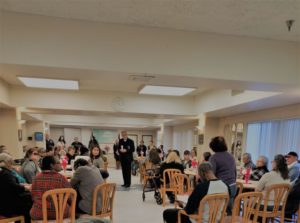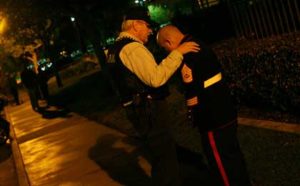By: Steve Ballinger, ICISF Member & Approved Instructor
 I became an Associate Pastor in 1993, during which time I was able to provide much spiritual counseling to those who were struggling with different issues of life (marriage problems, family problems, problems at work, loss of loved one, etc.). I desired to help bring a sense of balance and peace into their life by pointing them to a power much great than I. My hope was that they would put their faith in God and believe that He could give them guidance and direction in whatever their struggle was. It was something that brought tremendous satisfaction to me. I figure if God can change me, He can change anyone.
I became an Associate Pastor in 1993, during which time I was able to provide much spiritual counseling to those who were struggling with different issues of life (marriage problems, family problems, problems at work, loss of loved one, etc.). I desired to help bring a sense of balance and peace into their life by pointing them to a power much great than I. My hope was that they would put their faith in God and believe that He could give them guidance and direction in whatever their struggle was. It was something that brought tremendous satisfaction to me. I figure if God can change me, He can change anyone.
However, Sept 11, 2001 was a life-changing day for me and ministry. Not in a bad way, but simply a different way. Having been a firefighter for 20 years prior to becoming a pastor, when 9/11 occurred I had to respond. Nothing was going to hold me back. I wept when those towers collapsed because I knew I just lost hundreds of fellow first-responders. I had the opportunity to spend 16 days in New York City ministering to those who had been impacted as a result of that fateful day. First-responders, iron workers, heavy equipment operators, Respite Center personnel, people on the subway and those walking the streets all had a story to tell. I wanted to let them know they were not in this alone. Without being over-bearing, there were many opportunities to talk to and pray with people during my time there.
Shortly after returning home from New York City, I realized how unequipped I was to assist many of those who were traumatized. Oh sure, I was able to help people in the spiritual sense, but I was lacking when it came to assisting them in other domains of their life that had been impacted (physically, emotionally, cognitively and behaviorally) as a result of this traumatic event. I quickly realized I needed a lot more training if I was to truly help the entire person in their time of crisis.
Someone suggested I consider taking some CISM classes, which I had never heard of, but was willing to look into. After attending my first class, I was hooked. I began taking classes all over the United States. After taking 17 classes, I began to feel led to become an Instructor. Today I teach seven different CISM classes locally, nationally, and internationally.
In 2002, I became a Chaplain with the Riverside County Sheriff’s Dept., which provided me many opportunities to assist those in crisis. Since 2005 I have developed a chaplain program for the Riverside City Police Dept., Riverside City Fire Dept., Riverside County District Attorney’s Office, and Riverside Unified School District. With these organizations I have responded to natural deaths, suicides, drownings, fatal traffic collisions, school hostage situations, school shootings, child abuse and domestic violence incidents, etc. As a Chaplain with the BGEA Rapid Response Chaplain Team for the past 15 years I have responded to numerous disasters (natural and man-caused) across the United States.
As Chaplain for the Southern Calif. Chapter of Concerns for Police Survivors (COPS), since Mother’s Day 1993 I have personally been involved with 16 line-of-duty deaths involving police officers and firefighters. On six occasions I have attended National Police Week in Washington D.C. in order to minister to surviving family members. I have the privilege of being a volunteer member of The Counseling Team International (TCTI) with Dr. Nancy Bohl and her team of which I have learned a great deal when it comes to providing group crisis intervention.
I have now been a chaplain for 18 years and believe in chaplaincy so much that I have developed a 40-hour School of Chaplaincy. I train men and women up in chaplaincy and help place them into different sectors of our society.
 I say all the above in order to say this. CISM works! It works when it is done properly for the right people and at the right time. Over the years I have had many opportunities to provide one-on-one CISM to individuals, as well as provide Group CISM (CMB’s, Defusing’s, CISD’s). As I follow the SAFER-R Model with an individual, I have seen time after time the persons strong emotions drop dramatically. This occurs by allowing the person in crisis to talk; to tell their story; to ventilate; to emotionally barf. I have been with those who have been so emotionally upset that their entire body was shaking uncontrollably (i.e. young lady who had a gun put in her face & told she was about to die). As she was allowed to share her story (as many times as she needed), her uncontrollable shaking ceased to the point of calmness.
I say all the above in order to say this. CISM works! It works when it is done properly for the right people and at the right time. Over the years I have had many opportunities to provide one-on-one CISM to individuals, as well as provide Group CISM (CMB’s, Defusing’s, CISD’s). As I follow the SAFER-R Model with an individual, I have seen time after time the persons strong emotions drop dramatically. This occurs by allowing the person in crisis to talk; to tell their story; to ventilate; to emotionally barf. I have been with those who have been so emotionally upset that their entire body was shaking uncontrollably (i.e. young lady who had a gun put in her face & told she was about to die). As she was allowed to share her story (as many times as she needed), her uncontrollable shaking ceased to the point of calmness.
I have learned that the best characteristics of a crisis interventionist are 1) they are present, 2) they are compassionate, and 3) they are silent. When I am providing CISM to an individual or a group of people, I must be present. All of me! My ears, my eyes, my mind, my heart. I must be totally engaged and focused on the person(s) in front of me. I must give them my undivided attention. I want that person(s) to feel as if they are the only person(s) on the planet during our time together; that there is no one else more important than they. I have learned that it does not take much to stop a person from talking (i.e. cell phone goes off, look at your watch, scan the room, being judgmental, etc.).
I always want to show those in crisis compassion by being not only sympathetic, but empathic as well. However, with that said I have learned to show compassion with detachment. In other words, I cannot allow myself to become so personally involved with their crisis that I become as emotional as they are, otherwise I might end up in the pit with them.
By silence I mean I am not there to talk about me, but rather to learn as much as I can about them. I must know how to listen to them. That occurs by using active listening techniques. I must know what to say and when to say it. It has been said, “The ability to speak several languages is valuable, but the ability to keep your mouth shut in any language is priceless.” The wrong word can cause a lot of damage to a person in crisis. We should all learn to “taste our words” before we speak them.
I want to be able to assess the individual properly in order to provide the proper assistance. I want to assess the individual’s speech, emotions, activity and alertness. I want to understand their world as they see it and are experiencing it. I want to know what their real issue is. I have learned that it may not be the event I was responding to, but something completely different.
The most important thing I have learned when providing CISM is that it is not about me, but it is all about the person in crisis. I must set aside my bias’s and prejudices in order to provide the best assistance I can to the person(s) in order to help mitigate their stress in the situation. I may not agree with things they say or the way they are thinking as they share their story. If I can cognitively reframe, I will. But the truth is, it is not my crisis—it’s theirs. I want to understand where they are at in their crisis, and to let them know they are not alone in their crisis even though they feel all alone. I have learned the importance of getting a social support system (family, friend, co-worker, neighbor, spiritual adviser, etc.) to the individual as soon as possible, and to let them know there are many other resources available to them. I have learned that social support and resources can help greatly in mitigating the distress in the individual.
I have learned so much through taking CISM classes and I have seen those in deep distress recover quicker than I would have imagined. But, with all I have shared, please know I have not left my spiritual roots. I still believe strongly in the Word of God, and the God of the Word. I have learned that the philosophy of ministry outside the walls of the church is much different than inside the walls of the church. Both can be very effective. For me, the beauty of Chaplaincy is I am able to provide emotional care to those in crisis followed with spiritual care (to people of all faiths or no faith) if and when they are open to it, and without causing additional harm.